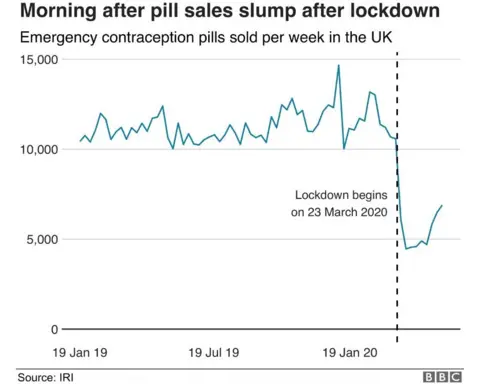Coronavirus: Morning-after pill access 'hit by lockdown'
 Getty Images
Getty ImagesLockdown saw access to the morning-after pill fall significantly, figures suggest.
Retail data show sales fell by 50% from March to April, while NHS prescriptions for the pills declined by around 20%.
The British Pregnancy Advisor Service (BPAS) says the figures support their call for emergency contraception to be available to buy in supermarkets without a consultation.
The government says any change in the law must meet safety criteria.
'Unplanned pregnancies could rise'
UK retail data from IRI, which include both over-the-counter and online sales, show the number of emergency contraceptive products sold fell from 38,553 units in March to 18,500 in April.
The figure rose slightly in May to 23,918.
The majority of morning after pills are issued over-the-counter in pharmacies, but NHS prescription data for England also fell.
Compared to 6,865 in January this year, there were 5,094 in March and 4,099 in April.
A fall in condom sales was also reported in April.

Emergency contraception is available for free from GP surgeries and walk-in-clinics and can be bought from chemists following a consultation with a pharmacist or after completing a questionnaire if purchasing online.
The Royal College of Obstetricians and Gynaecologists (RCOG) and BPAS want to bring the UK in line with other countries in Europe and the US by scrapping the consultation and making emergency contraception available in supermarkets.
"Removing barriers to this treatment is now more important than ever with pressures on health services due to the ongoing coronavirus pandemic," said Dr Ed Morris, president of the RCOG.
"It is only fair that women and girls are able to access emergency contraception in a setting of their choice, without the need for a consultation, as a matter of urgency."
The Faculty of Sexual and Reproductive Healthcare says services have been affected by its specialists having to be redeployed to treat Covid-19 patients.
A recent survey of members suggests 77% of GPs and 64% of specialists have ended or limited contraception services and other sexual health care since lockdown.
And the Advisory Group on Contraception has warned most surgeries stopped fitting coils and implants to protect both patients and staff from spreading coronavirus.
The Medicines and Healthcare products Regulatory Agency (MHRA) welcomes applications to enable wider access to a medicine, where it was safe to do so.
'Up to chance'
Deborah Evans, a pharmacist in Winchester and advisor for morning after pill brand EllaOne, said: "There's no doubt that lockdown has resulted in less casual sex.
"Demand for emergency contraception has dropped significantly and it has fallen in our local university cities with students away.
"But for those couples in lockdown together, I am very concerned that some are not seeking help and leaving an unplanned pregnancy up to chance."
Lockdown has also had an impact on women seeking to terminate a pregnancy.
BPAS, which carries out around a third of abortions in the UK has seen a 15% rise in consultations since April, from around 415 a day to 478 and claims cuts to contraception services, social distancing and the "stay home" message had prevented some from getting the help they need.
Katherine O'Brien, from BPAS, said: "It is unclear if the lockdown will lead to a baby boom, but what is certain is that without improvements in access to contraception, including emergency contraception, there will be a significant increase in unplanned pregnancies during the pandemic."
The law has already been temporarily changed to allow women who know they are pregnant to terminate by taking pills at home, instead of a clinic.
